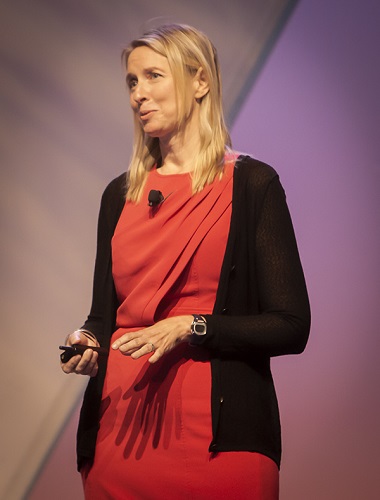HFMA’s Annual Conference: Joe Fifer calls on healthcare organizations to find ways to better address holistic health issues
- Healthcare organizations have financial and moral reasons to shift their business models to focus on the cost effectiveness of health.
- Organizations that move from fee-for-service to a more comprehensive approach can realize a significant ROI if they adapt their mindset.
- The link between kindness and good health should not be overlooked, according to a keynote presentation by psychiatrist and Columbia University professor Kelli Harding.
DENVER — During his annual industry update, HFMA President and CEO Joseph J. Fifer, FHFMA, CPA, said it’s past time for stakeholders to turn their attention to optimizing the cost effectiveness of health (CEoH) rather than simply focusing on traditional healthcare operations.
Choosing to meet the challenge “is choosing to stay true to the missions of most of our organizations: to help patients, to improve lives,” Fifer said Monday at HFMA’s Annual Conference.
A skewed financial structure
The fee-for-service payment system is blocking the transition to CEoH. The system is misaligned with the goal of supporting health while lowering costs as defined on a per member per month basis.
“If you get paid by the component, it sure is asking a lot to pay attention to the complete final product,” Fifer said.
“Consumers, on the other hand, are very much aware of the purchase costs of healthcare encounters over time — at least the portion that they’re paying out of pocket. And they’re interested in the outcome, not just for the encounter, but [for] their overall health experience.”
“So what we have here obviously is a bit of disconnect to say the least, and it seems complicated and sometimes it’s overwhelming.”
The disconnect is unsustainable, with government and commercial payers progressively moving to payment systems that incorporate risk. In addition, “Data about healthcare and health are being gathered and analyzed by big, well-capitalized entities,” Fifer said. “Just think about that for a second. Do you think that just might change how healthcare is purchased?”

A worthwhile step forward
Fifer believes there is “significant operating margin” to be gained by addressing the social determinants of health, or SDoH, “unless you’re fixated on fee-for-service.”
The opportunity is illustrated by the cases of patients with multiple chronic conditions, including mental health and substance-use disorders. Fifer said those conditions are among the most under-resourced in the healthcare system.
“What do those patients need? They need better support all the way around,” he said. “They need clinicians who know them, who know their backstory and can coordinate care for all their issues and make them feel like they’re not alone.”
For example, BHSH System (formed from the combination of Beaumont Health and Spectrum Health) has a comprehensive primary care program for high-risk Medicare Advantage patients. The care model includes components such as an SDoH assessment, superior care coordination, palliative care approaches and advance care planning. The program is funded through a full-risk arrangement with a payer.
Among the continuously enrolled population, there have been noteworthy reductions in emergency department visits and inpatient admissions during the three years since the program launched.
“This isn’t expensive, cutting-edge technology,” Fifer said. “It isn’t brain surgery. It’s a matter of focusing on care coordination, behavioral health and chronic-condition management. These outcomes can be replicated elsewhere.”
Why such outcomes matter
The chance to attain such improvements should be meaningful to everyone who works in healthcare, in part because the current rate of spending growth is unsustainable, Fifer said.
If left unchecked, “Healthcare spending will squeeze out other priorities. Some people make the argument that it already has. Some of those priorities, ironically, will relate to social determinants of health.”
Amid that pressure, he added, “The longer you wait [to evolve your model], the longer it’s going to take. And where will that put your organization in the market at that time? It’s not just a rhetorical question.”
In addition, the issue of health inequity demands greater attention: “Aren’t we compelled to understand why outcomes are different? Aren’t we compelled as health system entities, clinicians, hospitals, health plans, as part of our long-term success — in addition to our societal role — to address equity, equality and racism in our cost effectiveness of health journey?”
It’s true that the path ahead won’t be easy.
“The choice to move forward is a choice that takes courage,” Fifer said. “There will be days when obstacles seem insurmountable, days when you don’t have the energy for it, but the nature of a just cause is that you don’t have an end date. It’s never over. It’s a marathon, not a sprint. When the tough days come, courage can simply mean the resolve to try again tomorrow.”
Psychiatrist: Kindness is a determinant of health
In Monday’s keynote presentation, Kelli Harding, MD, MPH, discussed the science of kindness and the role it plays in health.
“When most people think about health and healthcare, they tend to think about advances in biomedicine, personalized medicine, incredible new breakthroughs in therapeutics, and all of that is absolutely critical,” said Harding, an author and assistant clinical professor of psychiatry at Columbia University Irving Medical Center.
But kindness, she said, is “an often overlooked yet vital part of health.”

Harding described a study of two groups of virtually identical rabbits in the late 1970s. Surprisingly, one group fared much better than the other in terms of health outcomes even though they were given the same high-fat diet.
The difference, scientists realized, was that the first group had been under the care of a researcher who treated the rabbits with special affection and kindness.
“What it basically says is that kindness had made all the difference,” Harding said. “Kindness had changed biology.”
Subsequent studies have revealed how kindness acts as a stress buffer, lowering cortisol levels. It also lowers blood pressure and reduces anxiety and depression.
Such links particularly resonate in the healthcare workforce these days, with the issue of mental health becoming an increasingly greater concern during the COVID-19 pandemic. In how healthcare workers treat colleagues and even in how they advise patients on mental health, Harding said, kindness should be a primary consideration. Giving kindness can be as much of a boost as receiving it.
Studies have revealed two things that promote kindness.
One is slowing down. “When we pause, when we slow down, we tend to be less biased, less judgmental,” Harding said. “And this can be done in many different ways. And it comes back to this saying: Be here, now.”
The other is showing gratitude, she said. “It’s quite striking, but little acts of gratitude actually can have a big difference.”





